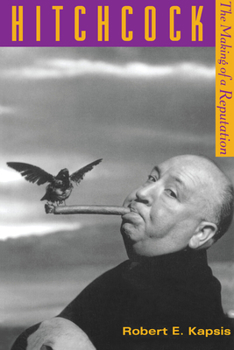Hitchcock: The Making of a Reputation
Select Format
Select Condition 
Book Overview
From the beginning of his career, Alfred Hitchcock wanted to be considered an artist. Although his thrillers were immensely popular, and Hitchcock himself courted reviewers, he was, for many years, regarded as no more than a master craftsman. By the 1960s, though, critics began calling him an artist of unique vision and gifts. What happened to make Hitchcock's reputation as a true innovator and singular talent? Through a close examination of...
Format:Paperback
Language:English
ISBN:0226424898
ISBN13:9780226424897
Release Date:October 1990
Publisher:University of Chicago Press
Length:330 Pages
Weight:1.18 lbs.
Dimensions:0.9" x 6.0" x 9.0"
Customer Reviews
1 rating
Scholarly Analysis of Hitchcock's Place in Cinema
Published by Thriftbooks.com User , 20 years ago
For more than fifty years Alfred Hitchcock dominated the film genre of mystery and suspense, first in England and after 1939 in Hollywood. Many of his films are viewed as classics--especially "Rear Window" (1954), "Vertigo" (1958), "Psycho" (1960), and "The Birds" (1963)--and as an artist in his chosen field Hitchcock is without parallel. Such was not always the always the case, however, for Hitchcock worked diligently for many years to build this reputation and for much of his career he was considered a capable director of entertaining films but certainly not an artist of overwhelming stature. Not until the 1960s, and especially the 1970s when the French "autuer" theory of film criticism began to dominate, did Hitchcock's reputation rise. In this book Robert E. Kapsis, a professor of film studies in New York, traces the change of Hitchcock's reputation from journeyman director, to capable maker of suspense entertainment, to artist. In so doing, Kapsis draws on a broad range of materials to show how Hitchcock orchestrated his own image and ultimately gained the recognition that he craved. Because of the French "autuer" theory, which held that over a career a director shaped a body of work that could be analyzed in the same way as a composer's or an artist's body of work. In that context, Hitchcock's films could be assessed and their effect on the thriller and horror genres of film determined. The rise of this school of film analysis served Hitchcock well, for even such films as "Vertigo," which were criticized as flawed when they first appeared, were later reassessed as significant parts of a larger body of work. This is a very good analysis, and Kapsis does well in making clear how Hitchcock's reutation changed over time in response to his own efforts, as well as those of others, and the changes of scholarly convention. It is scholarly and well-reasoned, but somewhat repetitious and written without a distinctive style. Even so, it is must reading for anyone seeking to understand the place of Alfred Hitchcock in the history of cinema.






